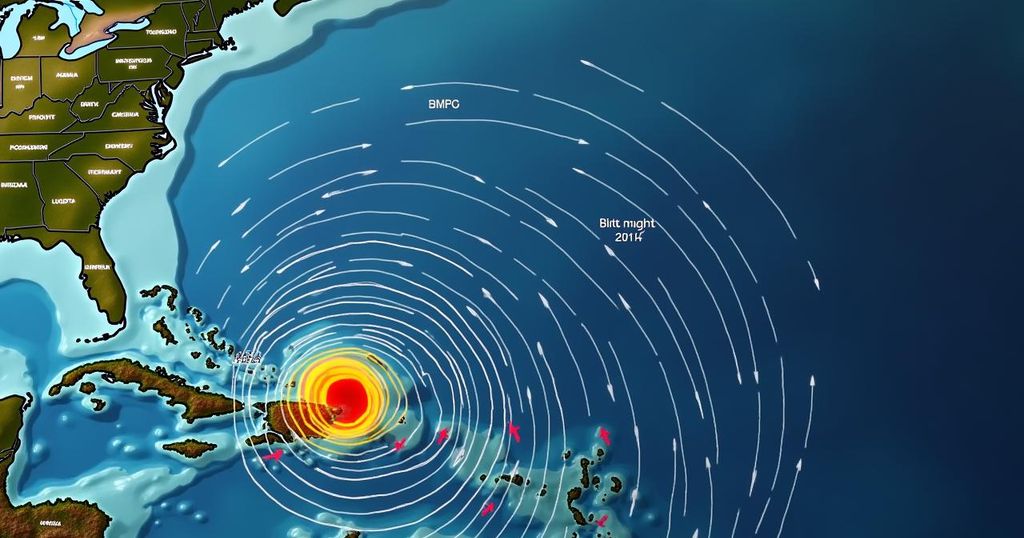Tracking Hurricane Milton: Impending Risks and Impacts on Florida
Hurricane Milton has formed in the Gulf of Mexico and is currently a Category 4 hurricane expected to make landfall in western Florida, bringing heavy rain, storm surge, and damaging winds. This hurricane follows the recent devastation caused by Hurricane Helene, marking a concerning trend in this year’s active hurricane season, which could witness 17 to 25 tropical storms overall.
Hurricane Milton, recently downgraded from a Category 5 to a Category 4 hurricane, has formed in the Gulf of Mexico and is currently being tracked as it approaches the western Florida peninsula. Forecasts indicate that Milton is likely to make landfall, which could bring significant rainfall, ocean surge, and damaging winds to the area. Affected regions may experience severe weather impacts that extend north and south of the storm’s center. The National Hurricane Center has issued warnings of potential flooding due to heavy rainfall expected to continue up to Milton’s arrival on Wednesday. This hurricane marks the second major storm to make landfall in Florida within a short period, following Hurricane Helene, which also reached Category 4 status and resulted in devastating storm surges along Florida’s Gulf coast. Helene’s path has been linked to over 220 fatalities across several states, underscoring the grave risks associated with such powerful storms. Hurricane formation occurs when tropical cyclones acquire the necessary atmospheric conditions, primarily warm ocean waters, which allow them to escalate in strength. Meteorologists classify a storm as a tropical storm upon reaching wind speeds of 39 mph, progressing to hurricane status once sustained winds reach 74 mph. These categorizations serve to inform authorities and the public regarding the potential hazards and anticipated damage, enabling timely warnings about impacts such as high winds, waves, rainfall, and flooding at landfall. The ramifications of tropical storm-force winds are significant, with stronger hurricane winds posing risks of severe structural damage, flying debris, and heightened storm surge, which constitutes the primary cause of hurricane-related fatalities in the United States. Moreover, as hurricanes move inland, the risk of flooding rapidly increases, with storms often leading to extensive rainfall that overwhelms drainage systems and saturates the ground, resulting in prolonged inundation for days following the storm’s passage. Historically, the peak of hurricane season occurs around mid-September. Projections from the National Oceanic and Atmospheric Administration suggest that this year’s hurricane season could be one of the most severe in recent decades, anticipating between 17 to 25 tropical storms, with a likelihood of four to seven developing into major hurricanes.
The article discusses Hurricane Milton, a recently formed Category 4 hurricane in the Gulf of Mexico, emphasizing its impending landfall in Florida and the associated risks such as heavy rainfall, flooding, and strong winds. It contrasts Milton’s trajectory with Hurricane Helene, which occurred just weeks prior and resulted in significant devastation and loss of life. The piece further outlines the processes by which tropical cyclones develop and strengthen, the classifications used to warn and prepare populations, and the broader context of the current hurricane season, which is projected to be particularly active.
In conclusion, Hurricane Milton presents significant risks to the Florida peninsula as it approaches land. With its trajectory indicating a potential for severe weather impacts, including flooding and dangerous winds, it is crucial for residents to stay informed and prepare for the storm. The cumulative effects of recent hurricanes, such as Helene, highlight the ongoing dangers posed by these powerful storms and the importance of preparedness and timely response.
Original Source: www.washingtonpost.com




Post Comment